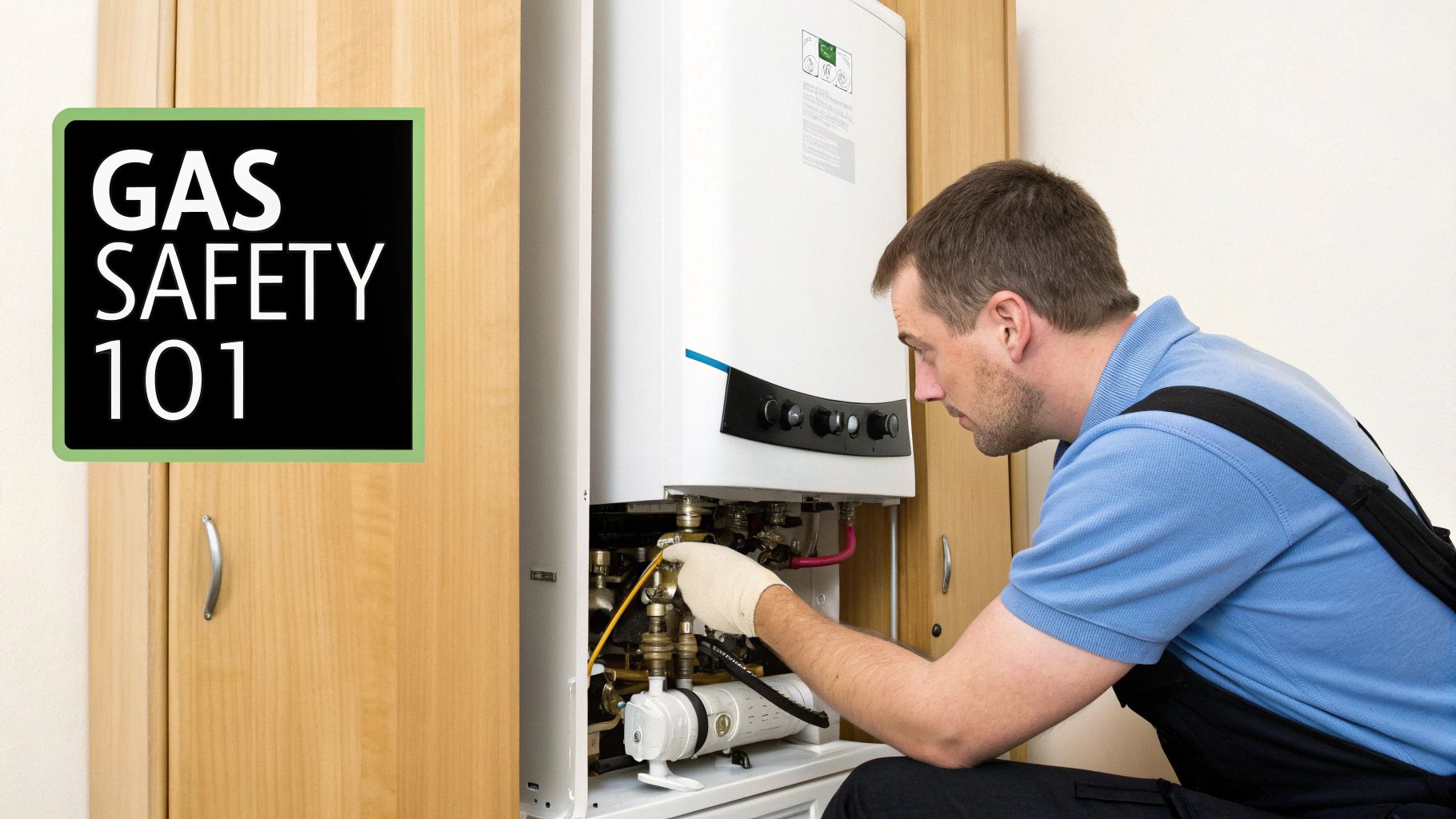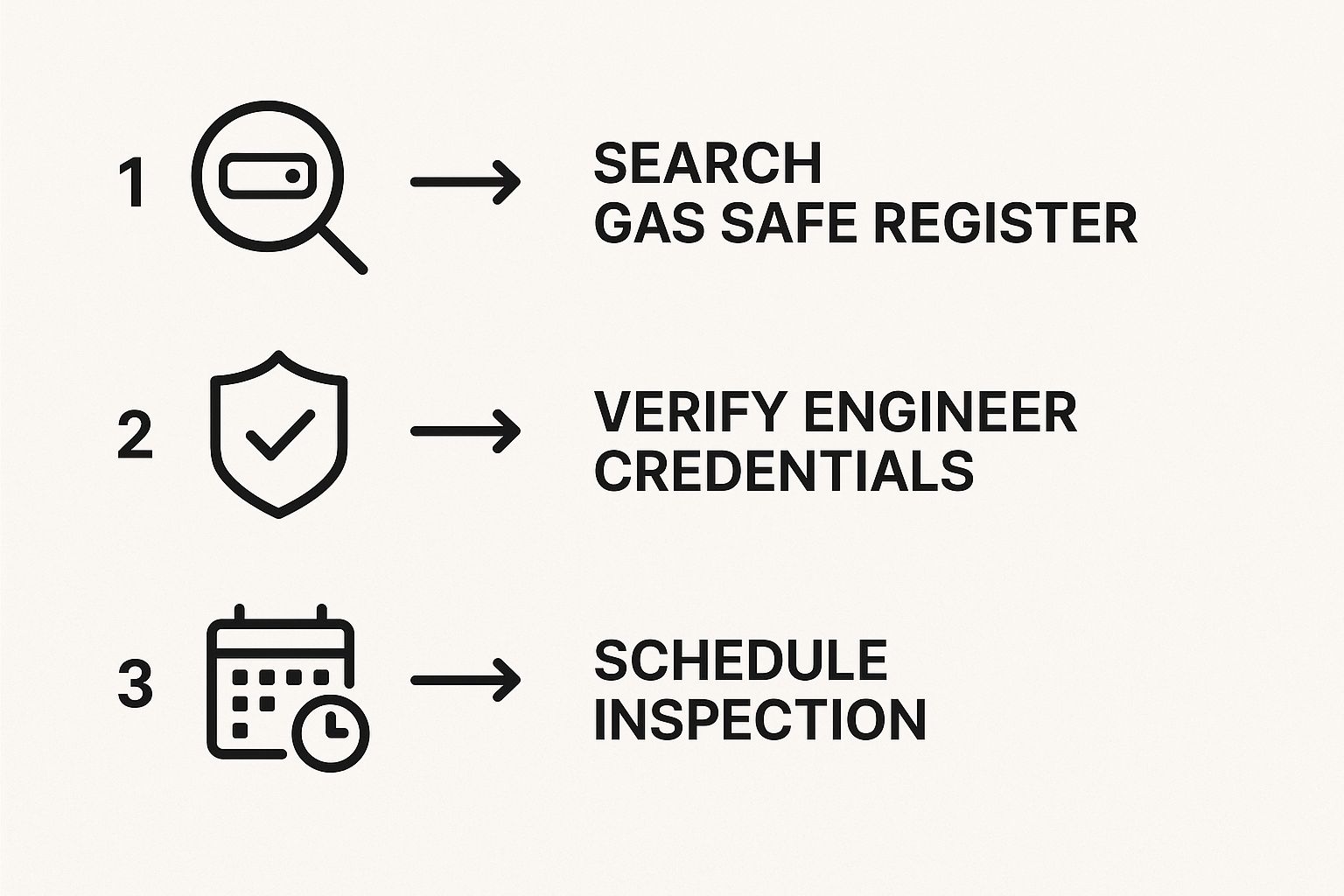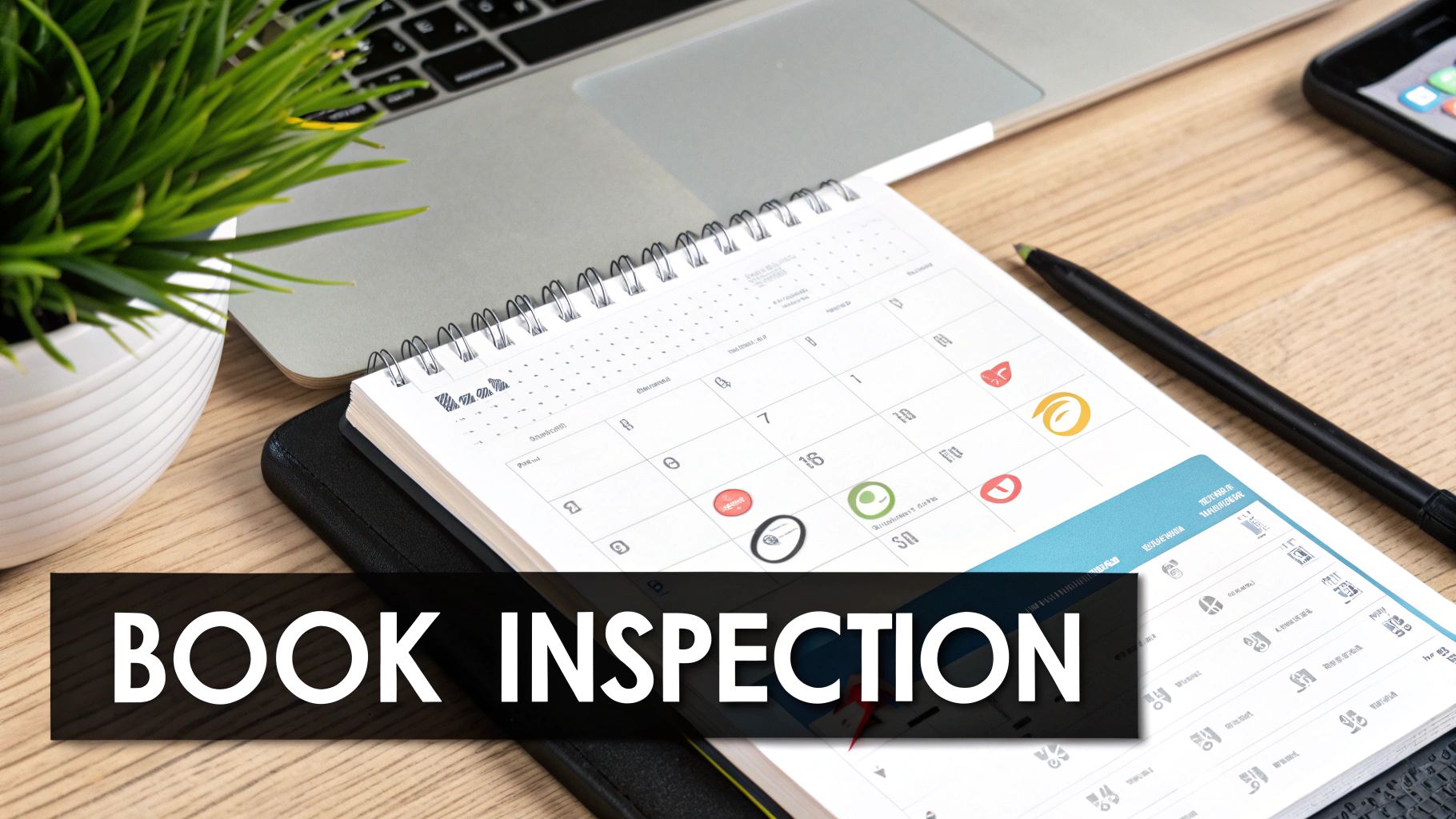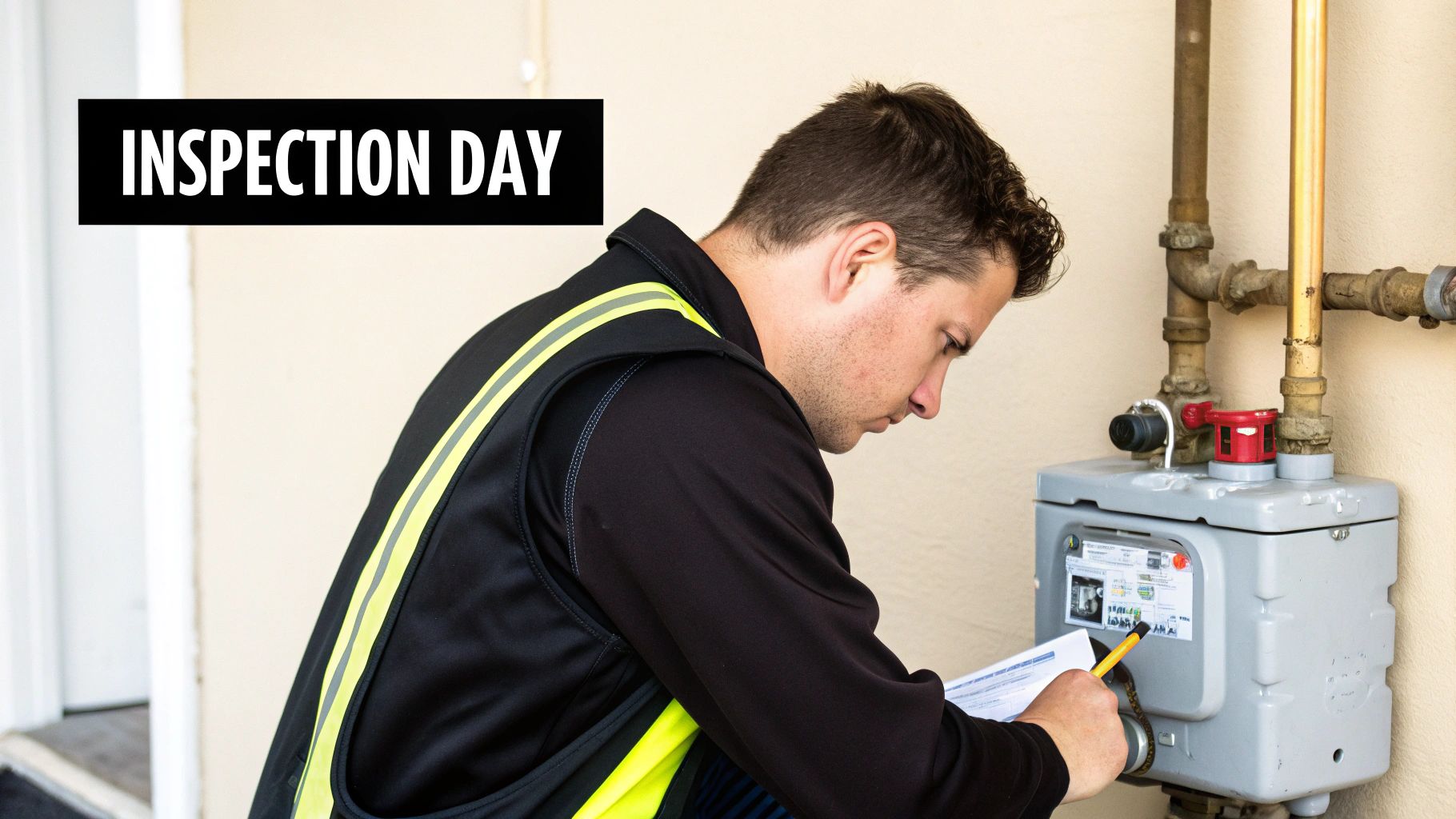How to Get Gas Safety Certificate in the UK | Easy Guide
- Luke Yeates
- Aug 26, 2025
- 10 min read
For UK landlords, getting a gas safety certificate isn't just a box-ticking exercise—it’s a fundamental legal duty. This annual inspection, carried out by a Gas Safe registered engineer, results in a Landlord Gas Safety Record (often called a CP12), which is your official proof that the property is safe for your tenants.
While it's not a legal requirement for homeowners, at Harrlie Plumbing and Heating, we always recommend it as a vital safety check for your own peace of mind, especially for families in and around Eastbourne.
Why a Gas Safety Certificate Is Non-Negotiable

Think of a gas safety certificate as more than just a piece of paper. It’s a cornerstone of responsible property management, governed by the Gas Safety (Installation and Use) Regulations 1998. This document confirms that all gas appliances, pipework, and flues on your property are working correctly and, most importantly, safely.
If you're a landlord anywhere in the UK, this check is mandatory every 12 months. Let's say you own a rental property in the Roselands area of Eastbourne and you’re getting it ready for new tenants. Before they even think about moving in, one of your first jobs is to get a certified professional in for a gas safety inspection. At Harrlie Plumbing and Heating, we handle these essential checks for local landlords all the time, ensuring they meet their legal obligations before a new tenancy begins.
Here’s a quick summary of the essential information about the Gas Safety Certificate, helping you grasp its purpose and your responsibilities right away.
Gas Safety Certificate at a Glance
Key Aspect | What UK Property Owners Need to Know |
|---|---|
What It Is | An official document confirming that all gas appliances, flues, and pipework in a property have been checked by a qualified engineer. |
Who Needs It | It is a legal requirement for all landlords in the UK. Homeowners are not legally required to have one but it's highly recommended for safety. |
Frequency | The inspection must be carried out annually, every 12 months. |
Who Can Issue It | Only a Gas Safe registered engineer is legally qualified to perform the check and issue the certificate. |
Your Responsibility | Landlords must provide a copy of the valid certificate to tenants within 28 days of the inspection and to new tenants at the start of their tenancy. |
Understanding these basics is the first step toward ensuring your property is both safe and compliant.
The Real Risks of Neglect
Failing to get a valid certificate isn't just a compliance headache; it's a serious gamble with safety. The Gas Safe Register's own data is quite sobering—it reveals that around 20% of UK homes they inspect have unsafe gas appliances. That statistic alone highlights just how crucial these annual checks are.
The dangers of a faulty gas system are real and can be devastating. We're talking about:
Gas Leaks: The risk here is obvious but terrifying. A leak can easily lead to a fire or, in the worst-case scenario, an explosion.
Carbon Monoxide Poisoning: This is the silent killer. CO is an invisible, odourless gas produced when fuel doesn't burn properly. You can learn what to do if your carbon monoxide alarm goes off in our detailed guide.
Appliance Malfunctions: Beyond the immediate dangers, faulty appliances are inefficient. They can lead to surprisingly high energy bills and the inconvenience of unexpected breakdowns, often at the worst possible time.
Ultimately, having that gas safety certificate in hand gives everyone involved—landlord, tenant, and homeowner—the confidence that a qualified expert has given the system a clean bill of health.
Finding a Qualified Gas Safe Registered Engineer
Getting a valid gas safety certificate all comes down to one thing: hiring a genuinely qualified professional. Here in the UK, that means you absolutely must use an engineer who is on the Gas Safe Register. This isn't just good advice; it's a legal requirement.
The best place to kick off your search is the official Gas Safe Register website. You can pop in your postcode and find local engineers in seconds. For instance, if you're a landlord with a property in the Meads area of Eastbourne, a quick search will bring up a list of certified companies nearby, like our team at Harrlie Plumbing and Heating. It’s a straightforward way to confirm a business is legitimate and legally allowed to work on gas systems.
Verifying an Engineer's Credentials
Once you’ve got a name, your due diligence isn’t quite done. Before you book anyone, you need to check their specific qualifications. It’s a common misconception that all Gas Safe engineers can work on every type of gas appliance, but that’s not the case.
Key Takeaway: The back of an engineer’s Gas Safe ID card lists the exact types of gas work they are certified to do. Always check this to ensure it matches the appliances in your home, such as boilers, gas cookers, or fires.
When an engineer from Harrlie Plumbing and Heating turns up at your door in Eastbourne, don't be shy—ask to see their Gas Safe ID card. This little card is their proof of identity and competence. Have a good look at the photo to make sure it’s them, check the expiry date, and most importantly, scan the list of qualifications on the back. Any legitimate professional will be more than happy to show you their card. It’s a simple step that guarantees the person working on your gas appliances is certified for that specific job.
Hiring the right person is about more than just ticking a legal box; it’s a smart move for the safety of your property and everyone in it. For more tips on selecting the right tradesperson, have a read of our advice on finding trusted plumbers in Eastbourne—many of the same principles apply.
What to Expect During a Gas Safety Inspection
So, what actually happens when your Gas Safe engineer turns up? It’s a lot more than a quick glance at your boiler. Think of it as a comprehensive health check for your entire gas system, designed to ensure every part is working safely and correctly.
Let's walk through a typical visit. Imagine one of our Harrlie Plumbing and Heating engineers arriving at a terraced house in Old Town, Eastbourne. The very first check is a gas tightness test, done right at the meter. This is a critical step that confirms there are no sneaky leaks anywhere in the pipework. It sets a baseline for safety before we even look at the appliances.
Once that's clear, we move on to the appliances themselves, like your boiler or gas hob. Here’s a breakdown of what the engineer will be looking at:
Appliance Checks: We’ll check that the gas is burning correctly by measuring the burner pressure and gas rate, making sure they match the manufacturer’s specifications.
Ventilation and Flues: Proper airflow is non-negotiable. The engineer will inspect all flues and chimneys to ensure they are clear and safely removing fumes from your home.
Safety Devices: Modern appliances come with built-in safety features, such as flame failure devices. We test these thoroughly to make sure they’ll cut off the gas supply instantly if a flame goes out.
This simple workflow shows how you can find and book a certified professional for these essential checks.

From the moment you start your search to the final booking, this process ensures you’re working with a legally qualified expert for the job.
A Real-World Example in Eastbourne
Back at that Old Town property, our engineer might find that while the boiler's combustion is spot on, the ventilation grille near the floor is partially blocked by a shoe rack. It's a common oversight we see in homes across Eastbourne!
They'll take the time to explain to the homeowner that this restricts essential airflow and advise them to keep the area clear. It’s this attention to detail that separates a checkbox exercise from a thorough, professional inspection by a company like Harrlie Plumbing and Heating.
A proper gas safety inspection is an interactive process. A good engineer won’t just tick boxes; they’ll explain what they're doing and offer practical advice to help you maintain a safe home environment.
By the end of the visit, you’ll have a complete picture of your system’s health. More importantly, you’ll have the peace of mind that comes with knowing your home is safe, ready for that all-important gas safety certificate.
How Much Does a Gas Safety Certificate Cost?

One of the first questions we always get at Harrlie Plumbing and Heating is about the cost of a gas safety certificate. It's a fair question, but the truth is, the price isn't set in stone. A few key things can influence the final figure.
Generally, you can expect to pay somewhere between £60 and £90 for a Gas Safety Certificate in the UK. The national average hovers around £80. This price typically covers the inspection of one or two appliances, like your boiler and a gas hob.
Got more gas appliances, like a gas fire? No problem. Just be aware that you’ll likely pay a small extra fee for each one, usually around £10 per additional unit. For a more detailed breakdown, Checkatrade has a helpful gas safety certificate cost guide that explores average pricing.
What Shapes the Price in Eastbourne?
Here in Eastbourne, the final quote can depend on a few variables. While the number of appliances is usually the biggest factor, other elements come into play too.
Number of Appliances: A standard check on a boiler and hob will always be on the lower end of the price scale.
Property Location: An engineer’s travel time can sometimes be factored in, especially if your property is in a more remote surrounding village like Pevensey Bay or Polegate.
Ease of Access: If your boiler is tucked away in a tight cupboard or an appliance is difficult to get to, it might take the engineer a bit longer, which could nudge the price up slightly.
For example, a two-bedroom flat down in Sovereign Harbour with a standard combi boiler and gas cooker will almost always be a straightforward, competitively priced job for a local firm like ours.
A Crucial Point: The fee you pay is for the inspection and the certificate itself. It does not cover the cost of any repairs if a fault is found.
If our engineer spots an issue that needs sorting before a certificate can be issued, we'll give you a separate, completely transparent quote for the repair work. It’s always a smart move to budget for the inspection and any potential repairs as two separate costs.
Managing Your Certificate and Staying Compliant

So, your Gas Safe engineer has finished the checks and handed you the Landlord Gas Safety Record. What now? This piece of paper is more than just a formality; it’s your proof of compliance, so understanding what it means and what your duties are is absolutely vital to staying on the right side of the law.
The certificate itself is packed with details, from the engineer's registration number to the results of every single safety check. But for landlords, the job isn’t done yet. You’re legally required to give a copy to your existing tenants within 28 days of the inspection. If you have new tenants moving in, they need a copy before they even get the keys.
Keeping on Top of Renewals
Staying compliant is a year-round job, and letting that certificate expire can bring a world of trouble. If you’re a landlord juggling multiple properties, it's easy to see how this can become a real administrative headache. It’s a bigger problem than you might think – a survey of UK social landlords found that less than half had managed to achieve full compliance, which just highlights how important good record-keeping is. You can read more about it in the full housing compliance report.
To avoid all that stress, you need to be proactive. We know a portfolio landlord here in Eastbourne who uses a simple spreadsheet to track the annual renewal dates for each of their properties in Hampden Park and Langney. It’s a straightforward but effective system.
Here are a few practical tips to stay organised:
Set Digital Reminders: Pop a reminder in your phone or calendar for two months before the certificate is due to expire. That gives you plenty of breathing room to book an engineer.
Keep Your Records Secure: Whether you’re old-school with a physical folder or prefer to keep things digital, make sure you hold onto your certificates for at least two years.
Build a Relationship: Working with a reliable local firm like Harrlie Plumbing and Heating means we can send you a reminder when your certificate is due, taking one job off your plate. For more advice, have a look at our guide on finding the right heating engineer in Eastbourne.
Answering Your Gas Safety Questions
Even with a clear process, it's normal to have a few questions rattling around. To help you feel completely confident, we’ve put together answers to some of the most common queries we get from property owners here at Harrlie Plumbing and Heating.
How Long Is a Gas Safety Certificate Valid For?
Your Gas Safety Certificate is valid for exactly 12 months from the inspection date. If you're a landlord, it's your legal duty to get it renewed every year to keep your tenants safe and stay compliant with the law.
Luckily, the regulations give you a bit of breathing room. You can get the next inspection done up to two months before the current certificate expires without messing up your annual renewal date. It's a handy way to stay organised without losing any time on your certificate's validity.
What Happens if an Appliance Fails the Safety Check?
If one of our Eastbourne engineers spots a problem during a check, their first priority is always safety. They’ll classify the fault based on how serious it is.
Immediately Dangerous (ID): This is the most serious. It means the appliance is a direct risk to life, and it will be disconnected from the gas supply on the spot.
At Risk (AR): This means the appliance has a major fault that could become dangerous. It will also be disconnected immediately.
If any appliance is flagged as ID or AR, you won't get a certificate. The engineer will give you a detailed report explaining the problem, and our team at Harrlie Plumbing and Heating can then provide a quote for the repair work. Once the issue is fixed and re-checked by a Gas Safe engineer, you'll be issued your certificate.
Do I Need a Gas Safety Certificate if I Own My Home?
While you're not legally required to have a gas safety certificate for a home you live in yourself, we highly recommend it. An annual check is genuinely the best way to make sure your gas appliances are running safely and efficiently.
Think of it as a yearly health check for your home's heating system. It offers incredible peace of mind, protects your family from dangers like carbon monoxide poisoning, and some home insurance policies are even starting to require it.
Is a CP12 the Same as a Gas Safety Certificate?
Yes, they're exactly the same thing. You'll often hear engineers and landlords use the term CP12—it's a bit of industry jargon left over from when CORGI was the main gas registration body.
The official name for the document is the 'Landlord Gas Safety Record'. But whether you call it a CP12 or a Gas Safety Certificate, everyone in the trade will know precisely what you're talking about.
For trusted, Gas Safe registered engineers who can handle your gas safety checks and any necessary repairs with expertise and care, get in touch with Harrlie Plumbing and Heating. Visit us at https://www.harrlieplumbing.co.uk for a free quote and reliable service in Eastbourne and the surrounding areas.

Comments